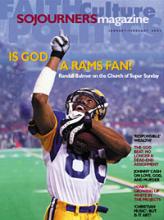President-elect George W. Bush, as a victor who lost the popular vote and won the presidency with a 5-4 Supreme Court decision, will face a divided nation—a House of Representatives with a razor slim Republican majority, a Senate split 50-50, a judiciary which has revealed deep chasms and taken blows to its credibility, and an executive branch struggling with perceptions as to its legitimacy. The electorate itself showed it was almost evenly divided on election day 2000, with millions of citizens feeling deep disappointment and even anger at the result. The racial dimensions of that alienation and disaffection are especially troubling.
It's time to ask what moral and political lessons must be learned from all this. First, the nation's electoral apparatus is terribly flawed, as this closest election in American history has painfully demonstrated. We've fallen well short of the democratic promise of universal suffrage, won through decades of struggle. The religious community should now play a leading role in the call for election reform as a moral issue, as we have so often in the past. From women's suffrage to the civil rights movement, people of faith have often been in the forefront of efforts to expand and extend democracy. The time for a new electoral reform movement has arrived. What would it take to address the problems we're now aware of? Here's a short list:
Congress should institute minimum and universal national standards for voting equipment, ballot design, and ballot counting. While the battle focused on a few thousand ballots in Florida, some 2 million votes nationwide were not counted for a variety of reasons. Even the majority opinion in the Supreme Court pointedly noted, "After the current counting, it is likely legislative bodies nationwide will examine ways to improve the mechanisms and machinery for voting."
Read the Full Article
